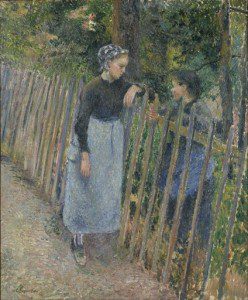
loving listening
The word in Latin for obey, obedire, oboedire also meant pay attention to, give ear, literally “listen to,” from ob “to” and audire “listen, hear.”
When we listen we obey the call of the moment, the call to attention. We turn; we leave other occupations behind. We make ourselves available. As some put it, we lend our ears. Or a shoulder to cry on.
But offering an ear or a shoulder is just a small part of it. Good listening is a discipline and an art form. A good listener doesn’t just offer release or a place for a speaker to vent or ramble, but invites and engages and explores. Good listeners seek to understand. They ask questions–imaginative questions, open ones, sometimes surprising questions that reframe the conversation. They muse. They examine. They speculate. They listen for both manifest and latent meanings. They are fully present and interested. If they’re listening to a crushing bore they find a way to take an interest, and find themselves interested. The role of the listener is not simply silent, nor passive. And listeners are not free of accountability for what they hear. On the contrary, we are deeply and consequentially responsible for what we listen to.
I’ve often appreciated the advice given by one of Hermann Hesse’s characters to another who was straining to hear a precious bit of Mozart on an old radio that offered mostly static: “Listen through the noise to the music.” “Listening through” is one discipline—sharpening the ear’s focus and opening the “deep heart’s core” where Yeats, standing “on the pavement grey” could hear once again the beloved sounds of Innisfree. “Listening into” is another. I learned from a beloved mentor, a generous and wise Austrian woman, the term “hineinlauschen”—to listen into what another was saying for overtones of longing, hope, hesitation, need. Listening into a child’s back-seat babbling we might hear the sound of learning happening. Listening into the oft-repeated story an aging father tells, whose window of memory has narrowed to a small repertoire, we might learn something even lovelier than patience.
Other prepositions help me imagine the spiritual discipline of listening as a practice that might stretch and open my heart in new ways:
I can “listen beyond” the predictable complaints of a neighbor for the low drone of loneliness she endures like tinnitus in the ear and, hearing that, move toward her rather than making an excuse to hasten away.
I can “listen up”—an expression I like for the vivid way it suggests a coach’s sudden call to attention. It’s a colloquial equivalent to the liturgical call in the Byzantine rite before the Gospel reading, a variant of the sursum corda: “Wisdom! Be attentive!” It’s a summoning into the present moment that used to be aided by Angelus bells.
I can even “listen past” the endless loop of muzak when I go into a store and direct my attention beyond them to the kindly words people exchange at counters and the “God bless you” of the woman who needs a little spare change and the quiet offers of ordinary assistance to elders: “May I help you with that?”
Bringing the practice of lectio divina to daily life can offer not only the rich moments of surprise that ancient practice consistently provides but also occasion to cultivate renewed receptivity to the Spirit who speaks throughout the day with a thousand voices, some of them still and small, and sometimes in words we know so well we barely hear them any more.












